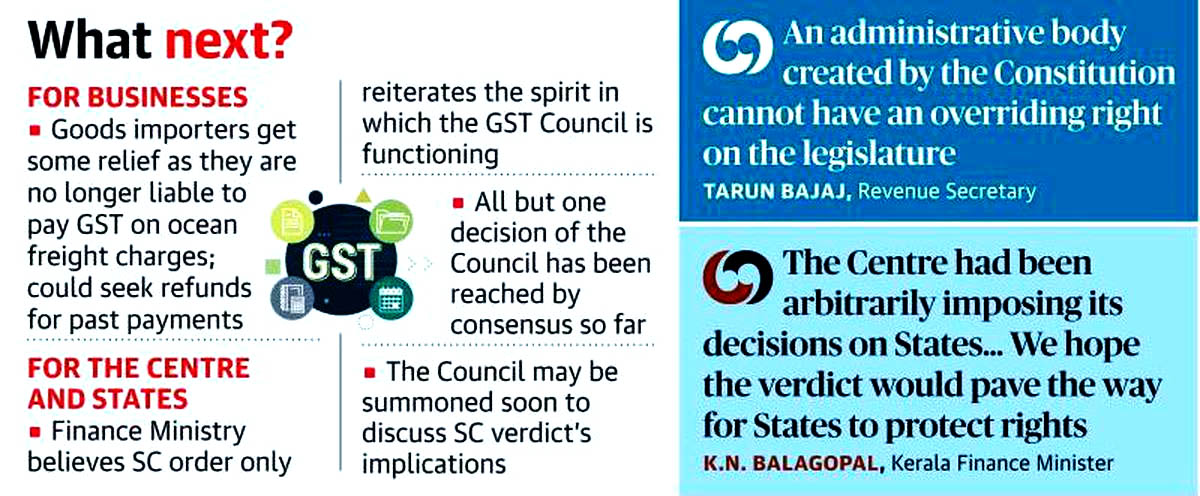Indian Economy
States’ Power to Make GST Laws
- 21 May 2022
- 8 min read
For Prelims: GST, GST Council, Supreme Court
For Mains: Cooperative Federalism and Competitive Federalism challenges of GST
Why in News?
Recently, the Supreme Court in a judgment championing the importance of “Cooperative Federalism” for the well-being of democracy, held that Union and State legislatures have “equal, simultaneous and unique powers” to make laws on Goods and Services Tax (GST) and the recommendations of the GST Council are not binding on them.
- The apex court’s decision came while confirming a Gujarat High Court ruling that the Centre cannot levy Integrated Goods and Services Tax (IGST) on ocean freight from Indian importers.
- The Supreme Court has held that GST on ocean freight paid in case of import of goods is unconstitutional.
What is the SC Ruling?
- Center and the States are “autonomous, independent and even competing units” while making GST laws. Cooperative federalism is treated like a marble cake federalism due to the integrated approach of the federal units.
- The recommendations of the GST Council are the product of a collaborative dialogue involving the Union and the states. They are recommendatory in nature.
- The recommendations only have a persuasive value. To regard them as binding would disrupt fiscal federalism when both the Union and the states are conferred equal power to legislate on GST.
- Emphasized that Article 246A (which gives the States power to make laws with respect to GST) of the Constitution treats the Union and the States as “equal units”.
- It confers simultaneous power (on Union and States) for enacting laws on GST.
- Article 279A, in constituting the GST Council, envisions that neither the Centre nor the states are actually dependent on the other.
- There are no provisions in the Goods and Service Tax Act, 2017 (GST Act) that deal with situations where there is repugnancy between the laws drawn up by the Centre and states, and it is for the GST Council to advise them suitably whenever such occasions arise.
What is Cooperative and Competitive Federalism?
- Cooperative Federalism:
- The Centre and states share a horizontal relationship, where they “cooperate” in the larger public interest.
- It is an important tool to enable states’ participation in the formulation and implementation of national policies.
- Union and the states are constitutionally obliged to cooperate with each other on the matters specified in Schedule VII of the constitution.
- Competitive Federalism:
- The relationship between the Central and state governments is vertical and between state governments is horizontal.
- This idea of Competitive federalism gained significance in India post 1990s economic reforms.
- In a free-market economy, the endowments of states, available resource base and their comparative advantages all foster a spirit of competition. Increasing globalisation, however, increased the existing inequalities and imbalances between states.
- In Competitive federalism States need to compete among themselves and also with the Centre for benefits.
- States compete with each other to attract funds and investment, which facilitates efficiency in administration and enhances developmental activities.
- Competitive federalism is not part of the basic structure of Indian constitution. It is the decision of the executives.
- The relationship between the Central and state governments is vertical and between state governments is horizontal.
What is Goods and Services Tax?
- GST is a comprehensive, multi-stage, destination-based tax that is levied on every value addition.
- GST is one indirect tax for the entire country.
- The GST council is the key decision-making body that will take all important decisions regarding GST.
Way Forward
- The judgment may change the landscape of those provisions under GST which are subject to judicial review.
- As the court has gone ahead to categorically hold that the GST Council recommendations have only persuasive value, there will be a pragmatic approach to the provisions which are subject to judicial review by way of challenge to the constitutionality of such provisions based on GST Council recommendations.
UPSC Civil Services Examination, Previous Year Questions
Q. Consider the following items: (2018)
- Cereal grains hulled
- Chicken eggs cooked
- Fish processed and canned
- Newspapers containing advertising material
Which of the above items is/are exempted under GST (Good and Services Tax)?
(a) 1 only
(b) 2 and 3 only
(c) 1, 2 and 4 only
(d) 1, 2, 3 and 4
Ans: C
Exp:
- Certain goods are kept under nil or 0% GST rate to benefit the masses. No GST is imposed on items like edible vegetables, roots and tubers, cereals, fish (not frozen or processed, fresh fruits and vegetables (other than frozen or processed), meat (other than in frozen state and put up in unit containers), cane jaggery (gur), tender coconut water, silkworm laying cocoon, raw silk, silk waste, wool, not carded or combed, cotton used in Gandhi Topi, cotton used in Khadi Yarn, coconut, coir fibre, jute fibre raw or processed but not spun, puja samagri, live animals (except horses), all goods of seed quality, coffee beans, not roasted, unprocessed green tea leaves, fresh ginger, fresh turmeric (other than in processed form), human blood and its components, all types of contraceptives, organic manure, other than those bearing brand name, kumkum, bindi, sindhur, alta, firewood or fuel wood, wood charcoal, betel leaves, judicial, nonjudicial stamp papers, court fee stamps when sold by the government treasuries or authorized vendors, postal items like envelope, post card etc. solid by government, rupee notes when sold to the RBI and cheques, printed books, including braille books, newspaper, maps, earthen pot and clay lamps, bangles (except those made from precious metals),
agricultural implements manually operated or animal driven, hand tools, such as spades shovels, handloom, spacecraft, hearing aids. - All the mentioned items in the given question, except processed and canned fish are included in the exemptions under the GST.
- Therefore, option (c) is the correct answer.





